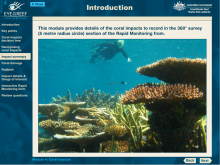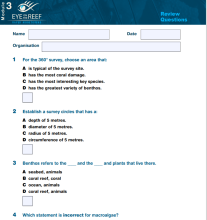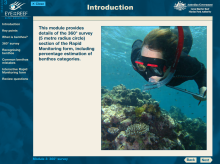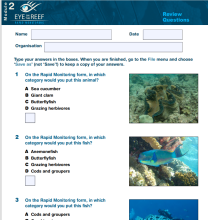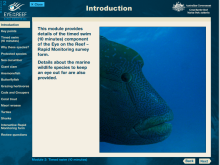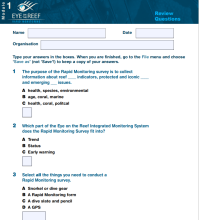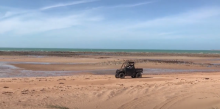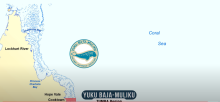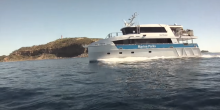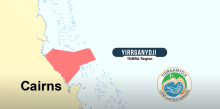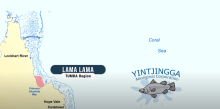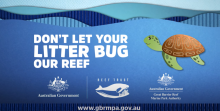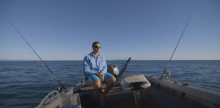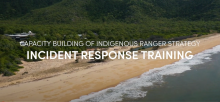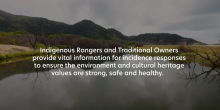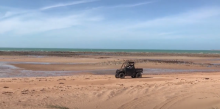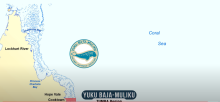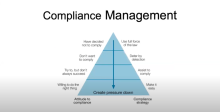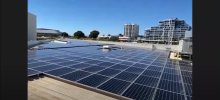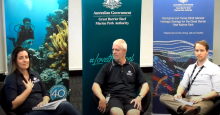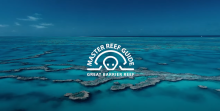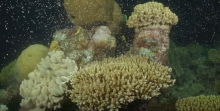- All pages
- Primary school
- Middle school
- Senior school
Rapid monitoring - Module 4
This module provides details of the coral impacts to record in the 360° survey (5 metre radius circle) section of the Rapid Monitoring from.
Rapid monitoring - Module 3 Review Questions
Test your knowledge of module three with these review questions.
Rapid monitoring - Module 3
This module provides details of the 360° survey (5 metre radius circle) section of the Rapid Monitoring form, including percentage estimation of benthos categories.
Rapid monitoring - Module 2 Review Questions
Test your knowledge of module two with these review questions.
Rapid monitoring - Module 2
This module provides details of the timed swim (10 minutes) component of the Eye on the Reef – Rapid Monitoring survey form.
Rapid monitoring - Module 1 Review Questions
Test your knowledge of module one with these review questions.
Pagination
Indigenous Rangers on the Reef
This video explains the Indigenous rangers program. It is a nationally-accredited training course by the Great Barrier Reef Marine Park Authority. It provides rangers with the skills to ensure Marine Park users comply with its rules and traditional lore.
Meet the Yuku Baja Muliku Junior Rangers
A video explaining the Yuku Baja Muliku Traditional Use of Marine Resources Agreement and their Junior Rangers from Far North Queensland.
Our field management team: on the frontline
A video showcasing the work of our field management team in the Great Barrier Reef Marine Park. The field management program is a joint initiative of the Great Barrier Reef Marine Park Authority and the Queensland Parks and Wildlife Service.
Traditional Use of Marine Resource Agreements
The Marine Park Authority and Traditional Owners are working together to integrate modern marine park management and traditional knowledge to protect this irreplaceable iconic World Heritage Area. This video explains these partnerships.
Yirrganydji Traditional use of Marine Resources Agreement
Video explaining the Yirrganydji Traditional use of Marine Resources Agreement and the projects they are undertaking.
Lama Lama Traditional Use of Marine Resources Agreement
A video about the Lama Lama Traditional Use of Marine Resources Agreement (TUMRA) that covers Sea Country which extends from Princess Charlotte Bay to the Normanby River, a rugged and breathtakingly beautiful part of the Great Barrier Reef.
Pagination
Don't let your litter bug our Reef
We all have a part to play reducing marine debris across the Great Barrier Reef. Plastic bags, discarded fishing gear, plastic and glass bottles, rubber thongs, aerosols and drink cans can harm wildlife and pose a navigational hazard.
Going fishing? How zoning helps hook you a catch.
A video explaining how zoning works and how it can help you catch fish.
Practical training for Indigenous Rangers to respond to incidents in the Great Barrier Reef
Video of the training delivered by the Great Barrier Reef Marine Park Authority. Training provided a unique opportunity for Traditional Owners to guide government bodies on how to respond to incidents using a broad range of considerations including cultural heritage.
Indigenous Ranger Training on the Reef
A video explaining Indigenous Reef Ranger training. This ranger training aims to cross-pollinate traditional knowledge with Western science to protect Indigenous heritage values and ultimately, the Great Barrier Reef Marine Park.
Indigenous Rangers on the Reef
This video explains the Indigenous rangers program. It is a nationally-accredited training course by the Great Barrier Reef Marine Park Authority. It provides rangers with the skills to ensure Marine Park users comply with its rules and traditional lore.
Meet the Yuku Baja Muliku Junior Rangers
A video explaining the Yuku Baja Muliku Traditional Use of Marine Resources Agreement and their Junior Rangers from Far North Queensland.
Pagination
Enhancing Reef compliance
In this live panel discussion, colleagues from the Great Barrier Reef Marine Park Authority’s Intelligence, Compliance and Field Operations team discuss how we undertake surveillance, act on reports of illegal activity and enforce penalties for offences.
Actions to address climate change
Live webinar from National Science Week 2020, our colleagues from the Great Barrier Reef Marine Park Authority discuss our position on Climate Change, how caring for the Reef is a shared responsibility and what we are doing to build Reef resilience with our actions.
Why is science important to us?
Live panel discussion as part of National Science Week 2020, we asked three of our colleagues at the Great Barrier Reef Marine Park Authority to share how they came to love science, what they love about the Marine Park and what they do in their jobs today to help protect the Reef.
What does it mean to be a Master Reef Guide?
Master Reef Guides are recognised as the world’s leading reef guides, interpreters and story tellers sharing the wonders of the Great Barrier Reef World Heritage Area. These reef ambassadors can provide up-to-date information on the Reef, share stories of the magical World Heritage Area, and explain what you can do to make a difference.
Coral spawning-this is the most important event of the year for the Great Barrier Reef
Video of one of the most spectacular events on the Great Barrier Reef, the annual synchronised spawning of corals.
Don't let your litter bug our Reef
We all have a part to play reducing marine debris across the Great Barrier Reef. Plastic bags, discarded fishing gear, plastic and glass bottles, rubber thongs, aerosols and drink cans can harm wildlife and pose a navigational hazard.

